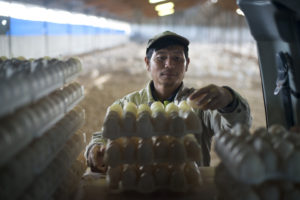Push for regional settlement of migrants
The federal government is considering encouraging migrant workers to settle in regional cities to tackle housing affordability at property hot-spots like Sydney and Melbourne, Immigration Minister Peter Dutton has confirmed.
The putative move comes after Treasurer Scott Morrison has made tackling housing affordability the centerpiece of the May 9 budget.
Mr Dutton told media that lot of work has been done between his department and Treasury and Finance to investigate the economic impact of people settling in Sydney or Melbourne in terms in terms of infrastructure and housing supply.
“And there are ways that we are looking at, that we might be able to provide support to people, to choose a regional city for example, if there’s work there,” Mr Dutton said last week.
 He said the migration intake should be driven by what’s in the national interest and that the numbers fluctuate in tandem with the economy as demand for foreign labour will wax and wane.
He said the migration intake should be driven by what’s in the national interest and that the numbers fluctuate in tandem with the economy as demand for foreign labour will wax and wane.
Mr Dutton said that most migrants chose to go to capital cities because they’re either chasing work, or they’ve got family, or an expat community there.
“The argument is how could we marry them up with regional communities, where there is a supply of work, where there is an ability to send kids to school and to be a part of community,” he said.
“Living in regional towns is a great way to raise a family, great way to be involved more intimately in the life of that community and housing and cost of living otherwise has the potential to be much cheaper than living in a capital city,” Mr Dutton said.
When asked if Australia should reduce migrant intake to handle housing affordability issue, Minister of Immigration Peter Dutton said, “our migration intake should be driven by what’s in our national interest”.
One successful example of regional settlement can be found at Nhill, in western Victoria, where a program to settle refugees has added more almost 100 jobs and more than $40 million to the local economy,
A study into the settlement program has revealed the benefits of embedding refugee communities in regional Australia.
Since early 2010 about 200 Karen refugees from Burma have been resettled at Nhill, a relatively isolated agricultural town, in north-western Victoria, initially to take up jobs at a local poultry producer.
The study into the economic and social impact of the resettlement, carried out by Deloitte Access Economics and settlement agency AMES Australia, has found the program produced significant economic and social benefits.
Over five years 70.5 full time jobs were created, representing a three per cent increase in total employment across the district, and $41.5 million was added to the Gross Regional Product.
Since the report was completed, another 27 jobs have been created in and around Nhill and there are now 35 Karen children in local schools.
The study, titled Small towns Big returns – Economic and social impact of the Karen resettlement in Nhill, found that like many other regional towns Nhill faced a declining working-age population and the resultant loss of services and amenities and the flow-on implications for the economic and social prosperity of the town.
It found that a declining population in the town and a very low unemployment rate were key factors in the resettlement.
“In particular there was a need for labour to support expansion of Luv-a-Duck, the largest local business, and driven by a combination of economic and humanitarian motivations, Luv-a-Duck management identified the Karen as potential employees,” the report said.
“Through a staged recruitment and resettlement process, the Karen community now comprises approximately 10 per cent of the Nhill population, including significant numbers of working age adults and families with young children. Furthermore, labour force participation linked to this population increase is high.
“Fifty-four Karen are directly employed in Luv-a-Duck, and seven employed in businesses that supply Luv-a-Duck. Beyond this, the increased population has enabled the creation and filling of additional jobs across a number of broader community businesses and services,” the report said.
The study also identified significant social outcomes stemming from the resettlement program, including: the arrest of population decline; revitalised local services and increased government funding; and, an increase in social capital across both communities.
Laurie Nowell
AMES Australia Senior Journalist












